My team at Kromatic and I originally published this post here on Grasshopper Herder, our lean startup blog. Kromatic’s mission is to help companies get to market fast and reduce the cost of innovation. Subscribe to our newsletter or speak to one of our coaches to see if we can help you reach your innovation goals.
Something has been irritating me: The startup community uses the words assumption and hypothesis interchangeably.
We also rarely use hypothesis correctly, often referring to laughably vague statements as hypotheses such as this gem I overheard:
Our hypothesis is that a $50k seed round will be enough to show traction.
I do the same damn thing, hence my irritation. So we should stop doing that, because it has an OVERSIZED effect on our next decision for our startup.
tl;dr:
Assumptions should be challenged and clarified with research. Falsifiable hypotheses should be tested with an experiment. -Tweet This
Bonus: I’m writing a more complete version of how to design great experiments as an open source “Real Book”, you can get on the download list here:
The Dictionary
While they are listed as synonyms by many dictionaries, they are really not the same word. Here’s a definition for Assumption from Merriam-Webster (because I’m too damn cheap to pay for the OED):
a fact or statement (as a proposition, axiom, postulate, or notion) taken for granted — Merriam-Webster
Here’s hypothesis:
an assumption or concession made for the sake of argument — Merriam-Webster
Oops…that’s almost identical and even used the word assumption, but not quite. It’s an assumption…for a specific purpose. Here’s a clearer definition.
a tentative assumption made in order to draw out and test its logical or empirical consequences — Merriam-Webster
Now that’s an interesting difference, and it’s important because depending on whether we have an assumption or whether you have a hypothesis, we should do two different things.
If we have an assumption, we accept the risk that the assumption is false and move on.
If we have a hypothesis, we attempt to falsify it.
Research Assumptions
If we look up a few more of assumption‘s numerous definitions we’ll also get a sprinkling of the religious roots of the word. That’s appropriate because the heart of the word is that we take it on faith.
For our startup, an assumption is usually something that we are not going to investigate. It’s something we will take on faith. We have many assumptions and they’re not all bad.
We might look at an analog to startup idea (a probiotic search engine) and see that the companies that sell probiotics have a lot of internet traffic and it’s growing month on month. We could then assume there is a sufficient market size to justify our interest.
That assumption may be disastrously wrong. Perhaps those companies are buying traffic with no profit to show for it, but we are free to make that assumption and take the risk.
If we have an assumption, we can either accept the risk or convert it into a testable hypothesis. -Tweet This
Hint: By “testable” I mean falsifiable.
Convert Assumptions into Hypotheses
As you can see, all the assumptions are vague, optimistic, and untestable. The vaguer they are, the harder they are to disprove.
What makes a good hypothesis? The Hypotheses are relatively specific and we can easily see how to design an experiment to get the data that could disprove that hypothesis.
Hidden Assumptions
The most dangerous kind of assumption is the one we don’t know we have. In Rumsfeldian, that’s an “Unknown unknown.”
To reveal hidden assumptions, there are a few tried and true generative research methods:
- Use a framework such as the Business Model Canvas to list your assumptions
- Have a peer challenge you with questions about your business model [hint: write them down]
- Watch your customers try to solve their own problems
- Talk to your customers!
When just starting, our biggest challenge is not to build an MVP, but to identify our own assumptions. -Tweet This
Ready to Test? What is a good hypothesis?
Before we get excited and start building anything and before we start talking about our hypothesis, let’s make sure it’s a real, falsifiable hypothesis and not just a vague assumption.
Look at the hypothesis and go through this checklist:
What have I missed on this checklist? Got a tip? Add it in the comments below!
Bonus: I’m writing a more complete version of how to design great experiments as an open source “Real Book”, you can get on the download list here:
My team at Kromatic and I originally published this post here on Grasshopper Herder, our lean startup blog. Kromatic’s mission is to help companies get to market fast and reduce the cost of innovation. Subscribe to our newsletter or speak to one of our coaches to see if we can help you reach your innovation goals.
